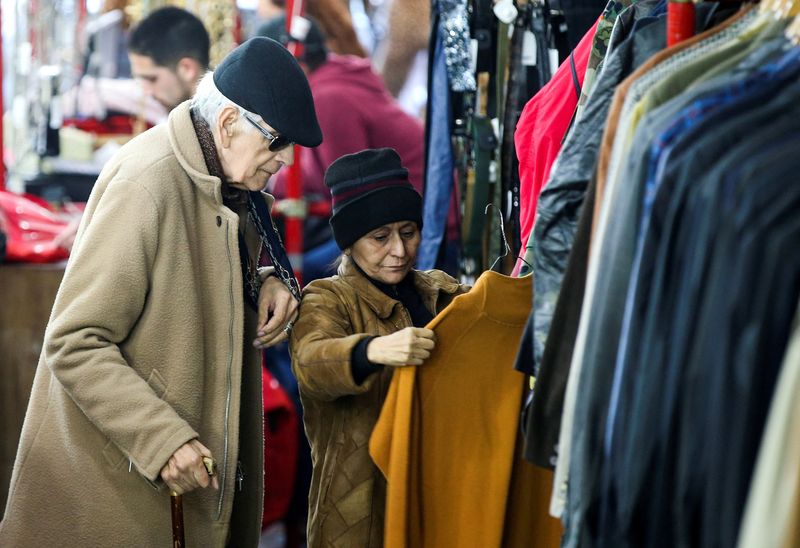By Miguel Lo Bianco and Claudia Martini
BUENOS AIRES (Reuters) -Hard-up Argentines, tightening their purse strings with inflation topping 140%, are increasingly turning to second-hand clothing markets, both to find affordable apparel and raise extra cash from selling old garments.
The South American nation, the region's No. 2 economy and a major grains exporter, is facing its worst crisis in decades. Two-fifths of people live in poverty and a looming recession is shaking up Argentina's presidential election run-off next Sunday.
Rising voter anger is propelling a radical outsider, Javier Milei, the slight favorite in polls on the presidential election to beat Economy Minister Sergio Massa, the candidate of the ruling Peronist coalition, whose bid has been hobbled by his failure to rein in rising prices.
"You can't just go to the mall and buy something you like as you did before. Today prices are unthinkable," said Aylen Chiclana, a 22-year-old student in Buenos Aires.
New jeans cost more than double the price a year ago, representing over one-third of Argentina's monthly minimum wage.
Annualized inflation hit 142.7% in October, the country's statistics office said on Monday, with the monthly rise landing at 8.3%, although that was down from peaks in August and September and below analyst forecasts.
Argentina has for years battled high inflation, which economists blame on money printing and an entrenched lack of confidence in the local peso. Inflation has accelerated over the last year to its highest since 1991.
Beatriz Lauricio, a 62-year-old semi-retired teacher, said that she and her husband, a bus company employee, go on weekends to a clothing fair to sell old garments to make ends meet.
"We're middle class, lower middle class, I would say. We have our jobs but we need to come to the fair," she said, adding that when it was canceled one weekend due to bad weather the couple's finances "collapsed."
"We're not doing this as a little extra so we can go on vacation to Brazil, we do it out of daily necessity," Lauricio said.
María Silvina Perasso, the organizer of the clothing fair in Tigre, on the outskirts of Buenos Aires, said many people shop there because prices have risen far faster than salaries. The local monthly minimum wage is 132,000 pesos, $377 at the official exchange rate but half that at real street rates due to capital controls - restrictions on foreign exchange transactions.
"With the economy the way it is, they buy clothes at 5% or 10% of the value that comes from a store and they can buy things for their families," she said.
María Teresa Ortiz, a 68-year-old retiree, lives off her pension and from casual sewing work, which pays her 400 pesos an hour, officially about a dollar. She goes to the fair to be able to afford clothes she otherwise couldn't buy.

"We simply can't buy new things. You can't buy new sneakers, you can't buy new flip-flops, you can't buy new jeans, you can't buy a shirt or a T-shirt either. So you have to look for them at the fairs," she said.
($1 = 349.9500 Argentine pesos)